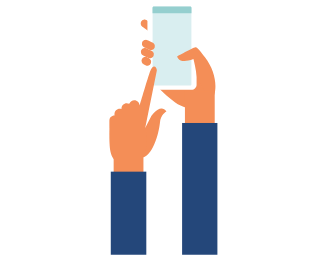Being my own best friend and finding my freedom
I’m Emily, aged 27, and I am in recovery from anorexia nervosa. 
From the age of 11, I’ve been fighting a silent battle with my mental health. I was diagnosed with anorexia in 2008 but I struggled for three years prior to the day of my diagnosis.
Wearing what I call my “I’m fine” mask has blocked out distress, trauma, health challenges, and devastating life events. It has guarded me from the pain, protected me from people’s judgements, actions and hurt. Given me control. Completely numbed me and been a way to be able to disconnect and forget; yet still be this strong, smiling, determined, giving, achieving Emily for everyone around me in my life.
But underneath this mask was so much more. Depression, anxiety, self-harm, suicidal thoughts, PTSD, flashbacks, voices, and anorexia had consumed both my mind and body in a terrifying and frightening way. However, it was also like they were my best friends, giving me the comfort, safety blanket and coping mechanisms I didn’t have but desperately needed. They felt like something that was there for me; that would help make everything feel ok and get me through everything that life had thrown my way. This made it so much harder for me to be open and accepting of help and support, which prevented me accessing treatment.
What led to my struggles? I have recognised now there were many contributing factors including devastating emotional abuse from a family member throughout my childhood and teens, witnessing domestic violence, painful family breakdowns and having to give evidence in court. I also experienced traumatic and unexpected bereavements of my three role models, family illness and being a young carer, school bullying, peer pressure, high education expectations, housing and accommodation challenges and homelessness. Not knowing my place of belonging in the world, and not feeling loved and wanted, also contributed. In addition I have cerebral palsy and spine conditions, which have involved complex scary treatments and endless surgery.
“I felt a lot of guilt and shame for being Emily.”
To everyone around me I was always trying to show a happy and smiling face on the outside, whilst in reality I was broken and hurting. I was listening to my “best friend” anorexia, and the self-harm voices. Restricting my food, excessively exercising, and punishing my body through self-harm is all I could think about in my foggy, clouded mind. The physical pain every time I didn’t allow myself food, or I hurt myself, would numb my emotions and give me the respite I desperately needed. I was angry but instead of directing it to others, I directed it to myself because I never wished anyone, not even my worst of enemies, to go through everything I had. Family relationships were broken beyond repair, and I couldn’t, and wouldn’t dare, tell anyone of the emotional abuse I was going through for fear of it getting worse. I felt overpowered by fear and unable to make sense of the chaos and confusion, voices and flashbacks but still I maintained my “I’m fine” mask. I didn’t want to seem ungrateful or selfish to the many other people who were still caring about me, loving me, supporting me, guiding me, saving and changing my life. I was ashamed to be Emily and knew that to show the real me I would have to be weak and vulnerable.
My road to recovery
Recovery is a rollercoaster full of ups, downs, twists and turns, loop-de-loops and backwards drops. My journey involved a lot of medical and therapeutic intervention as well as self-guided support.
In the Child and Adolescent Mental Health Service (CAMHS) I had two inpatient admissions followed by intensive home-based treatment. As a young adult I had further inpatient treatment, including being sectioned, before a period of full recovery. However, in 2015 I had a very rapid and severe relapse and was sectioned again. This would then follow with three further inpatient admissions and time in day-patient treatment up to 2017. Over this time, I’ve had lots of different types of treatment including group therapy, family therapy, art and trauma therapy, meal support, cognitive behavioural therapy (CBT), The Maudsley Model of Anorexia Nervosa Treatment for Adults (MANTRA), dialectical behaviour therapy (DBT), body image treatment, as well as tube feeding during medical admissions.
“I am now four years out of inpatient treatment and to this day I continue to work hard on my recovery as an outpatient.”
Talk ED’s support services and mental health helplines, Mind, Action for Children and Samaritans have played a massive part in my recovery, as well as very close friends from both in and out of treatment, along with some family. Many medical professionals have helped me, including my GP, eating disorder and mental health team, my social worker and supported accommodation care co-ordinator, my eating disorder consultant and dietitian.
What recovery means to me
To me, recovery means having my health (mental and physical) and happiness back. To have dreams, goals and opportunities; to go to university; travel the world; go back to my hobbies. To have a family and buy my own home. To love myself and be my own best friend – and to just feel free.
Recovery for me is being able to manage my meal plan, understand my triggers, be brave enough to be open and honest when I need to be, and be gentle with myself. To help me, I journal for self-care and to self-soothe, practise grounding mindfulness, and write.
Healing is never a straightforward path, it’s about rediscovering the healthy, thriving, happy you. Have hope and never give up. The light at the end of the tunnel is somewhere in sight – it will be a hard battle but worth the fight.
